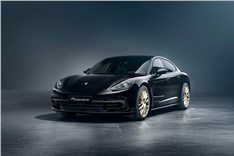Porsche Panamera Sport Turismo review, test drive
The Panamera is a niche car, the station wagon is a niche body style. So, what on Earth does that make the Porsche Panamera Sport Turismo?
Published on Jan 01, 2018 07:00:00 AM
27,291 Views
Follow us on
Think of it more as a different style statement rather than a more practical option.


Estate boot doesn’t add much space or practicality to the Panamera; just 50 litres.
The confusion starts pretty early on, actually. I’m handed a key, and as I walk up to the parade of Panameras parked before us, I click down the unlock button and walk up to the white one that lights up. But it’s not until I walk around to the back of the car to load my bag into the boot that I realise I’ve been given the key to a ‘regular’ Panamera, and not the Sport Turismo. The two are identical from the nose to the rear door, and even beyond that, the roof is raised so subtly, you might not be able to spot it at first glance. Heck, the Sport Turismo even has the same tail-light cluster as the standard car, with the band of red LEDs sitting above the word ‘Porsche’ and connecting a pair of slim 911-like lamps on either side. The roof of this estate car actually tapers downward ever so slightly, which makes you wonder, how much more space could they have possibly squeezed out of it?
PRACTICAL MAGIC
The answer to that is 50 litres, which seems like a pittance, when you consider that an estate is an entirely different body style designed for added practicality. In fact, Porsche’s own product presentation shows that the Sport Turismo can only take one suitcase more than the normal car. And thanks to the sloping roof, packing it to its rafters doesn’t take much; it doesn’t have the square loading area you’d expect from a more utilitarian body. What’s the point of that?
The greater benefit, you’ll find is in how much easier it is to load now. The loading sill is far lower, carved into the bumper rather than above it, which I notice as I haul my bag over the tall lip of the regular Panamera.
| Porsche Panamera Price, Mileage, Specifications, Features and Variants | |
|---|---|
| Brand | Porsche |
| Model Name | Panamera |
| Porsche Panamera Price | ₹ 1.93 - 2.70 crore |
| Porsche Panamera Range/Mileage | NA |
| Porsche Panamera Specifications | Coupe | 5 doors | 4 seats View All Specs |
| Porsche Panamera Features | Matrix LED headlight | 12.3-inch Touchscreen display | 6 airbags View All Features |
| Porsche Panamera Variants | 2.9 Petrol V6 | GTS 4.0 V8 Petrol View All Variants |
And, for the first time in a Panamera, you can have a bench seat in the back. Yes, no longer are you restricted to a pair of individual rear chairs, as snug and sporty as those are, but once again, this isn’t the game-changing feature you might think it is. The ‘bench’ is still made up of two ‘chairs’ and the only difference is that there’s a third seat belt, and a cushion in place of the storage console that once resided between the seats. This cushion is raised, narrow and not very comfortable, and the poor soul who’s sat here will have their legs splayed astride the wide central tunnel. So it’s only a bench in concept, and the Panamera Sport Turismo is a 4+1 seater at best. Yes, headroom is more than you get in a regular Panamera, thanks to the taller roof, and legroom is pretty good too, but you still feel very cocooned back here, without the same sensation of vastness that you’d get in a proper luxury sedan.
Everything else from the Panamera returns too – good things like the flawless build quality, semi-digital five-pod instrument cluster and snug bucket seats. And also things that border on the outright ludicrous, like a smudge-happy, black touch control panel for even mundane tasks like the blower speed, and air con vents that can only be adjusted via the touchscreen!
YES, BUT IS IT A PORSCHE?
It most certainly is. Thanks to a finely honed formula in the chassis and dynamics department, Porsche somehow makes even its largest and flabbiest cars nicer to drive than anything else of a comparable size and girth. The Panamera is not a small car; it’s long and it’s wide and visibility, rearward, is not great. But once you get to grips with the dimensions, the way it drives is really something special.
The Sport Turismo feels exactly the same to drive, although, if anything, the view out back is even worse, thanks to the porthole-like rear windscreen. The steering is on the heavy side, but not enough to be a burden; instead it’s a good heft that keeps you on your toes, reminding you that you’re in charge of a serious piece of hardware. After a go in the ludicrously powered 680hp Panamera Turbo S E-hybrid ‘sedan’ earlier in the day, I’m trying out the Sport Turismo in Turbo form – yup, the good ol’ fashioned V8 internal combustion-only model. And I never thought I’d see the day when a twin-turbocharged car with electric power steering felt like the purer driving experience. The hybrid model, with its electric intervention, greater kerb weight and wooden regenerative brakes left me feeling a bit disconnected. But the Turbo? Oh no, this one lets you feel what’s going on between the steering rack and the wheels, the pedal and the brakes. And since they’ve managed to almost entirely eliminate turbo lag, power delivery is just relentless. It’s the same 4.0-litre twin-turbo V8 with 550hp and 770Nm of torque as we get in our ‘normal’ Panamera in India, and with its eight-speed PDK gearbox and AWD, it will crack 100kph in 3.6sec.
ENTER THE WAGON
Even Porsche doesn’t quite have a properly defined handle on what the Sport Turismo is. They’re reluctant to call it a station wagon or say that it’s the more practical alternative, because it barely is. There was mention that it’s the midpoint between a Panamera and a Cayenne, but that seems like too tenuous a description for a brand that’s a niche in itself. The best way I think it can be described is a different shape. It doesn’t have to fulfil a different purpose or play a different role. Like Audi’s sedan versus ‘Sportback’ – ultimately, one just looks a bit different. With prices marginally higher than the standard Panamera in India, that’s how buyers would have to see it too. Speaking of prices, the Sport Turismo Turbo costs Rs 2.3 crore (ex-showroom, India) while the Turbo S E-hybrid is also available for Rs 2.38 crore.
Will there be takers? We’ll have to wait and see, but perhaps this will be the car that makes estates cool again.
Tech Specs 
Copyright (c) Autocar India. All rights reserved.









.jpg&w=234&h=156&q=90&c=1)
 Price
Price Engine
Engine Transmission
Transmission Body
Body Dimensions
Dimensions
Comments
Member Login
Personal Details
No comments yet. Be the first to comment.